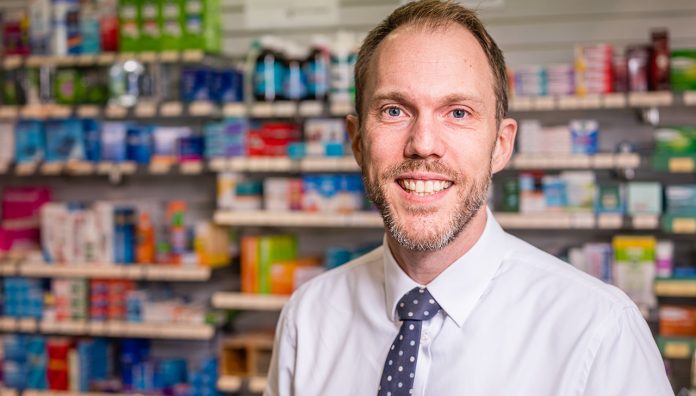After moving from Sweden 20 years ago, Tasmanian Pharmacist of the Year Fred Hellqvist MPS, owner of Dover Pharmacy, has become a leading voice for rural pharmacies across Australia.
What brought you to Dover, Tasmania, from Sweden?
As part of any degree in Sweden, you have to do a thesis, and Professor Ron Quinn from Griffith University was visiting Gothenberg. We discussed a possible thesis and he was happy for me to come out and do it. I did my six-month thesis in Brisbane in 2000, that’s where I met my wife Katie Stott, and I just stayed in Australia from there.
So, where does your passion for rural pharmacy stem from?
I started working in Australia in a regional centre for a couple of years and realised that seeing patients over and over again meant you found out more things about them, they trusted you more, and you could more easily solve their problems. I would encourage pharmacists who haven’t given rural practice a proper go to actually do so because it’s professionally rewarding.
How did you become co-chair of the new Rural Pharmacy Network Australia (RPNA) group?
RNPA has grown out of another group Terry Burnett, my wife and I started a couple of years back called the Small Pharmacies Group. The intention of that group was to connect smaller pharmacies because we all felt isolated. It quickly turned into advocacy and from there we realised there were a lot of issues rural in nature that needed their own forum, the RPNA.
What’s on your RPNA wish list?
Outside the metropolitan areas, the more rural you go, the more the chronic disease burden goes up. But the way the remuneration system works is volume-based. We need to put in mechanisms where clinical work is actually acknowledged and we are rewarded for the work we’re doing.
How do you attract and retain staff in remote locations?
A comprehensive package of workforce incentives is needed that brings pharmacy in line with the incentives available to other professions practicing in rural areas. Community pharmacy employers need to be able to offer better remuneration as well.
What do you believe is the biggest opportunity for rural pharmacy?
It’s a buzzword at the moment with health, but we’re a health hub. We triage a lot, we refer people who are at heightened healthcare risk, and we treat the people we can treat as best as we can to fill holes in the health care system. But we need support to continue to do so.
What are your main goals over the coming years?
Basically, to keep advocating for rural pharmacy and to gain more resources so we can adequately help our patients and our regions. Personally, I’d like to hire more pharmacists so I can do more of the things we are doing. Because there is quite a big unmet need out there.
What do you need out of the 7CPA?
RPNA is calling for a Rural Viability Package as part of 7CPA – a package that compensates rural pharmacies for the higher costs associated with delivering care to disadvantaged patients, the costs associated with attracting and retaining staff in rural and remote locations, and appropriate and flexible funding for clinical healthcare services.
It is vitally important that such a package is delivered to ensure that rural pharmacies are sustainable into the future and able to provide the care their communities need and deserve. Community pharmacy employers need to be able to offer better remuneration as well as other incentives such as extended paid leave, formal career development and recognition opportunities, housing, transport and family support.



 John Jones MPS, pharmacist immuniser and owner of My Community Pharmacy Shortland in Newcastle, NSW[/caption]
John Jones MPS, pharmacist immuniser and owner of My Community Pharmacy Shortland in Newcastle, NSW[/caption]


 Debbie Rigby FPS explaining how to correctly use different inhaler devices[/caption]
Debbie Rigby FPS explaining how to correctly use different inhaler devices[/caption]




 Professor Sepehr Shakib[/caption]
Professor Sepehr Shakib[/caption]

 Lee McLennan MPS[/caption]
Lee McLennan MPS[/caption]
 Dr Natalie Soulsby FPS, Adv Prac Pharm[/caption]
Dr Natalie Soulsby FPS, Adv Prac Pharm[/caption]
 Joanne Gross MPS[/caption]
Joanne Gross MPS[/caption]








